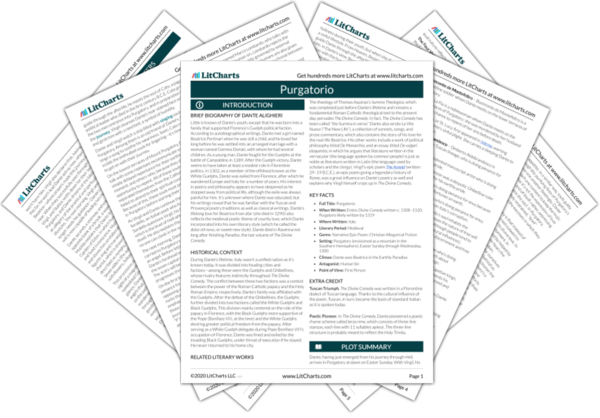Minor Characters
Casella
Casella is a musician friend of Dante’s. He sings him a soothing song upon arriving in Purgatory.
Sordello
A 13th-century Italian poet, Sordello becomes Dante’s and Virgil’s guide through the earlier levels of Purgatory.
Manfred
During his lifetime, Manfred was an Italian ruler who was excommunicated from the Church but repented just before death. Now, he must wait for centuries on Purgatory’s lowest terrace before undertaking further penance.
Belacqua
Belacqua is a lazy Florentine friend of Dante’s who delayed repentance until the end of his life.
Jacopo del Cassero
Jacopo del Cassero is a fellow Guelph soldier whom Dante meets on the lower terraces of Purgatory.
Buonconte de Montefeltro
Buonconte de Montefeltro is a Ghibelline soldier whom Dante meets on the lower terraces of Purgatory.
La Pia
La Pia is a noblewoman whom Dante meets on the lower terraces of Purgatory; she was murdered by her husband and had no chance to repent of her sins before death.
Lucia
Lucia, or St. Lucy, first appeared in
Inferno, warning
Beatrice of
Dante’s sinful plight. She carries a sleeping Dante to Purgatory’s gate.
Omberto Aldobrandesco
Omberto Aldobrandesco is offspring of a noble Tuscan lineage, who is doing penance for his earthly pride.
Oderisi
Oderisi is a talented manuscript artist who is doing penance for his earthly pride.
Provenzan
In life, Provenzan was a despotic Ghibelline ruler and is now doing penance for his earthly pride.
Sapia
Sapia is a woman who’s doing penance for envy because she took delight in others’ misfortunes on earth.
del Duca
del Duca is an Italian who’s doing penance for envy, and who offers a lengthy diatribe on Italy’s corruption.
Marco Lombardo
Marco Lambardo’s soul inhabits the wrathful level of Purgatory. He discusses the nature of free will with Dante. Lombardo explains that, although people tend to blame human behavior on the stars (natural influences), humans also possess the gifts of rational discernment and free will.
Pope Adrian
Adrian is a 13th-century pope who’s doing penance for avarice because he cared too much about accumulating earthly power during his brief reign.
Hugh Capet
Progenitor of the French line of Capetian kings, Hugh Capet now does penance for avarice. He laments his descendants’ devastating effect on Europe due to greed and cruelty.
Forese
Forese was an earthly friend of Dante’s whom Dante sees on the gluttonous level of Purgatory.
Bonagiunta of Lucca
Bonagiunta of Lucca was a hard-drinking poet of the 13th century. Dante encounters him doing penance for gluttony.
Guido Guinizelli
Guido Guinizelli is a poet doing penance for lust.
Arnaut Daniel
Arnaut Daniel is a poet doing penance for lust.
Matilda / The Lady
Matilda is a mysterious, joyful lady and Beatrice’s companion. Dante encounters her in the Earthly Paradise. She submerges Dante in the stream called Lethe to erase his memories of sin, and later she submerges him in the river Eunoe to restore his cleansed memories.
Gryphon
The gryphon is a half-eagle, half-lion creature who draws Beatrice’s chariot in the Earthly Paradise. The gryphon’s dual nature reflects Christ’s human and divine natures.
The Four Virtues
The Four Virtues are four dancing ladies in the Earthly Paradise, symbolizing the virtues of prudence, temperance, justice, and fortitude.
The Three Graces
Like the Four Virtues, the Three Graces are dancing ladies in the Earthly Paradise. They symbolize the Christian graces of faith, hope, and love.
